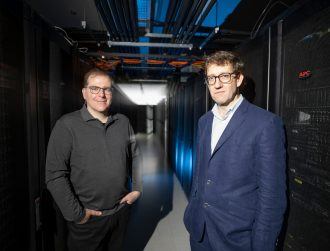Science
UCD Acquires €724,000 Nvidia Supercomputer to Advance AI Research

University College Dublin (UCD) has announced the acquisition of a new Nvidia supercomputer valued at nearly €724,000. This investment aims to enhance AI-powered research on campus and provide students from diverse fields with access to cutting-edge technology. Named the Advanced UCD Research in Artificial Intelligence (AURA), this project marks UCD’s most significant investment in AI supercomputing to date.
AURA is expected to deliver performance capabilities that are 50 times greater than UCD’s current high-performance compute cluster, known as SONIC. The supercomputer features Nvidia’s DGX B200 system, which includes eight Blackwell chips and offers a training performance that is three times superior to its predecessor. According to Prof Aonghus Lawlor, the project lead, this advanced system will significantly boost research capabilities across the university.
The funding for AURA is provided through the Higher Education Research Equipment Grant. With the order now placed, the supercomputer is anticipated to arrive on campus by early 2024. In addition to this new supercomputer, UCD has invested approximately €1.45 million over the past year to upgrade its existing computing clusters, solidifying its position as the most powerful Irish university for AI and high-performance computing.
The demand for AI computing resources has surged in recent years, driven by advancements in technology and the increasing effectiveness of AI techniques. Dr Brian Mac Namee, co-principal investigator of the AURA project and site director at the Insight Research Ireland centre for data analytics, emphasizes the growing breadth of application areas for AI. He states, “AI techniques and models have become more effective – you can just do more with them.”
AURA is set to support a wide range of research areas, including healthcare, cultural and political analysis, business, and weather and climate modeling. Prof Gerardine Meaney, director of the UCD Centre for Cultural Analytics, plans to utilize machine learning to analyze extensive historical and cultural datasets. She believes that AI trained on these datasets can help uncover narratives and voices that have been historically overlooked, particularly regarding gender bias.
In another research realm, Dr Andrew Hines, director of graduate research at the School of Computer Science, focuses on machine perception. His work aims to enhance how machines perceive visual and auditory information, improving consumer products like video conferencing tools. “Things that would have taken a year on the kind of standard GPUs that we were using – you can do in days with this new supercomputer,” he explains, noting the significant boost in research output expected from AURA.
UCD plans to make AURA accessible to all students, allowing them to apply for opportunities to train their models on the supercomputer. Dr Mac Namee highlights the importance of providing students with access to state-of-the-art computational platforms, stating, “This kind of computation platform allows us to do that.” He adds that experience with advanced models will give students a competitive edge in the job market.
As the project evolves, thousands of students are expected to benefit from AURA throughout its operational lifespan. The university anticipates that AURA will not only enhance research but also foster an environment where students can engage with leading-edge technology in their academic pursuits.
-

 Entertainment3 months ago
Entertainment3 months agoAnn Ming Reflects on ITV’s ‘I Fought the Law’ Drama
-

 Entertainment4 months ago
Entertainment4 months agoKate Garraway Sells £2 Million Home Amid Financial Struggles
-

 Health3 months ago
Health3 months agoKatie Price Faces New Health Concerns After Cancer Symptoms Resurface
-

 Entertainment3 months ago
Entertainment3 months agoCoronation Street’s Carl Webster Faces Trouble with New Affairs
-

 Entertainment3 months ago
Entertainment3 months agoWhere is Tinder Swindler Simon Leviev? Latest Updates Revealed
-

 Entertainment4 months ago
Entertainment4 months agoMarkiplier Addresses AI Controversy During Livestream Response
-

 Science1 month ago
Science1 month agoBrian Cox Addresses Claims of Alien Probe in 3I/ATLAS Discovery
-

 World2 weeks ago
World2 weeks agoBailey Announces Heartbreaking Split from Rebecca After Reunion
-

 Health4 months ago
Health4 months agoCarol Vorderman Reflects on Health Scare and Family Support
-

 Entertainment4 months ago
Entertainment4 months agoKim Cattrall Posts Cryptic Message After HBO’s Sequel Cancellation
-

 Entertainment3 months ago
Entertainment3 months agoOlivia Attwood Opens Up About Fallout with Former Best Friend
-

 Entertainment2 weeks ago
Entertainment2 weeks agoCoronation Street Fans React as Todd Faces Heartbreaking Choice



















